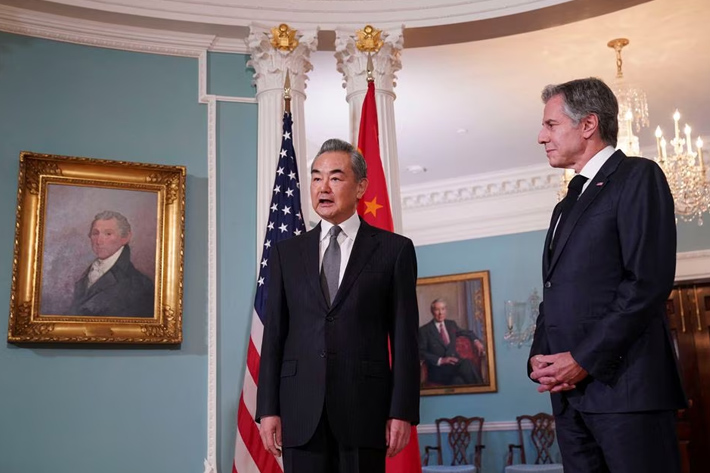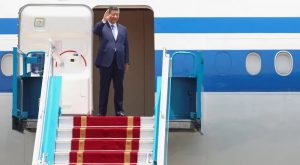China’s top diplomat Wang Yi said on Sunday that the path to a much anticipated meeting between President Xi Jinping and US President Joe Biden “will not be a smooth one.”
Wang’s comments came after Beijing and Washington agreed on Friday to work together toward the meeting planned on the sidelines of an Asia-Pacific Economic Cooperation forum summit in San Francisco in about two weeks time.
Speaking after hours of meetings with senior US diplomats in Washington, spanned over two days, Wang said the “road to the San Francisco summit will not be a smooth one”, and travelling there would not be on “autopilot”.
Also on AF: Huawei, US-Sanctioned Firms Win as China Dumps Western Tech
Wang said China and the US needed to “return to Bali”, referring to the last meeting between Biden and Xi, on the sidelines of a Group of 20 summit last November.
Washington and Beijing must put into practice the consensus achieved then, “remove interference, overcome obstacles, enhance consensus and gather outcomes”, the Chinese foreign minister said.
He said both sides have jointly sent out positive signals to stabilise and improve relations, believing it is useful and necessary to maintain dialogue, as there are still various differences and contradictions, and issues to be resolved.
Efforts to stabilise ties between the world’s two biggest economies come amidst an intense trade and technology war, that has seen both sides enforce export restrictions on key technologies and metals.
The push has seen a flurry of bilateral diplomatic engagements in recent months, largely at US’s request.
The Biden administration sees direct leader-level engagement with Xi as particularly important in managing tensions as it seeks to prevent relations from veering into conflict.
Understanding of ‘strategic intention’ key
When asked about Wang’s comments, China’s foreign ministry spokesperson Wang Wenbin said on Monday that China and the US needed an objective understanding of each other’s strategic intention and to take the correct view of competitive factors in future exchanges.
“Wang Yi pointed out that looking back on the tortuous course of Sino-US relations since beginning of this year, the experience is worth summarising and the lessons need to be learned,” Wang said at a regular press briefing.
In highlighting the talks, the ministry spokesperson said China’s top diplomat stressed that the most important thing is to abide by the consensus of the two heads of state, to stabilise bilateral relations between China and the United States, and to maintain open channels of communication.
Last month, China’s top security agency suggested any Xi-Biden meeting in San Francisco hinged on the US “showing sufficient sincerity”.
US officials, however, seem to be making a firm push for the Xi-Biden summit.
“We are making preparations for such a meeting,” said one of the senior administration officials briefing reporters on condition of anonymity. “Obviously, Chinese leaders often confirm publicly much closer to a trip, so I will leave it to the Chinese side to figure out if and when they make that announcement,” the official said.
“A big part of a potential meeting would be the two leaders sitting down together and having those conversations on strategic intent,” the US official said.
View this post on Instagram
‘Candid’ talks
Wang’s three-day visit to the US last week was the first trip by a Chinese foreign minister to Washington since 2018.
He met US President Biden for an hour. White House described their talks as a “good opportunity” in keeping lines of communication open.
Wang told Biden that the objective of his visit was to help “stem the decline” in US-China ties “with an eye on San Francisco”, without giving any details, according to a brief statement from the Chinese foreign ministry.
“China attaches importance to the US side’s hopes of stabilising and improving US ties with China,” Wang was quoted as saying in his meeting with Biden.
Wang also met US Secretary of State Antony Blinken and national security adviser Jake Sullivan. US officials described their interactions as “candid and in-depth”.
The foreign ministry readouts for Wang’s meetings with Blinken and Sullivan said that “both sides agreed to work together to achieve a meeting between the two heads of state in San Francisco.”
China-watchers in Washington unconvinced
Upon his arrival in the US on Thursday, Wang told Blinken that the two countries have disagreements and need “in-depth” and “comprehensive” dialogue to reduce misunderstandings and stabilise ties.
Saturday’s discussions also included in-depth exchanges on the interaction between China and US militaries, finance, science and technology, China’s investment environment and market access, as well as the Middle East and Ukraine crises.
Meanwhile, China watchers in Washington have questioned whether a slate of mostly unreciprocated US cabinet-level official visits to Beijing over the past six months, including by Blinken, Treasury Secretary Janet Yellen and Commerce Secretary Gina Raimondo, played into Beijing’s hand.
The trips by Yellen and Raimondo led to new bilateral economic and commercial working groups, which critics worry will only pull US focus away from – and possibly delay – sanctions, export controls and broader measures intended to enhance US competition with China.
US officials have maintained that increased diplomacy does not mean a let-up in policy.
View this post on Instagram
- Reuters, with additional editing by Vishakha Saxena
Also read:
US Expands Ban on Top AI Chips, Curbs to Hit Many Countries
China Curbs Export of Key EV Metal as Tech War With US Deepens
China Tensions Leave US Firms Between a Rock and a Hard Place
US Business Outlook in China Sinks, Firms Looking at SE Asia
Raimondo Warns China Patience Of US Business ‘Wearing Thin’
China Stalling Merger Reviews of US Chip Firms, Others – WSJ
























